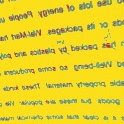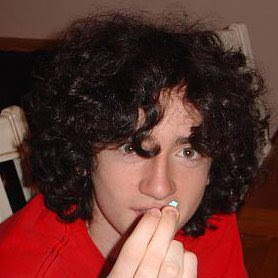facebook
A son turned 21 on Wednesday, and in honor of his birthday, I bombed his Facebook account, maybe a dozen times, with all manner of pictures,
pop art, messages, birthday greetings, etc. It was similar to visiting him in his dorm, as he was surrounded by friends there in (he has over 500 linked to his account, impressive), and they were using it: popping in, saying hello, talking about a movie, speaking French with him, or whatever. As one who had not really been in FB for more than a few seconds previously, it was an eye-opener. I learned a lot.
1. There was a lot of talk about the "new" FB; I had a hard time remembering the "old" one, or really understanding the difference. One difference is that you get a lot of feeds from your friends; you know more about them perhaps than they wanted you to. To me huge differences have been the appearance of chat (a little light at the bottom, only when I'm on Firefox), and the ability to make a movie, on the spot (if you have a webcam, which I do at work)...and put the movie directly into your FB.
2. As for the chat, which I'm really most interested in, your "community" (I have ~100, mostly former students, but some family) is who you see; there's always someone there. How addictive! Not that my former students want me to always be tapping on their shoulder! But, they've always taken the time to talk, when I did. Saw my daughter on there that very night, and she's the one who told me about the movie: just sign up for the application, give FB permission to use your webcam, and make it!
3. So, I made a movie, but found myself mumbling into the webcam and probably didn't get the hang of controlling the volume adequately. So I could bring a banjo to this? So I could make a pronunciation lesson? So I could have my students do an assignment and drop it in my FB?
4. There's a group, "Million people opposed to the new FB" or some such; I will get references up soon as I actually went and read to see what it was all about. Learned two things: lots of people were opposed to the new FB, mostly because of the privacy thing; that million number doesn't mean a whole lot. Somebody
wants a million. My son says FB is pretty good with the innovations; he trusts that they've done a wise thing; he likes them as a tech hub, in comparison to others that we all use, like blogger, yahoo, flickr, etc. He, of course, has the most invested; my daughter (30) is into it but says most in her generation are not; one son (16) has an account (of course) but doesn't actually use it that heavily. Some people, I can tell you now, are on there quite a bit; they live there. Most of these people are between 20-24, like my son, I'd wager. Some are in my generation.
5. FB's main innovation was to make it so
others could add applications, so that they could take advantage of the general competitive sense of "we'll provide something cool for everyone." If you make a venue where people can come along, try their hand at making a cool thing, and lay it on the table, they will, and everyone will win. But mostly you will win. Because your place will be the happening place.
I keep up with FB, and like it, though as I've said, I was a little unclear on "new" vs. "old" as it's all a little "unfamiliar." Most of all, I liked getting all over my son's life, as I miss him a lot, and we really kind of celebrated his passing through that big door, the door of adulthood, together,I felt; although it was virtual, I went there, hung around, listened in on his friends, saw what he was doing, etc. Once the cameras make it possible to do that in 3d, I'll be able to walk him down the hill to town (which is Lawrence KS btw) and actually
see all his friends too, but for now, this was the best I could do without actually driving there, and it was good enough, it had to be. But one more point I need to make which I'm still mulling over. The "friends" distinction is often a barrier; for example I can't really show my own "friends" what I did; on the other hand, having only my "friends" be actually in the chat room, as I've said, definitely distinguishes that chat room from a variety of others. But the open/shut nature of that system surely raises a lot of questions. Young people, for example, I'm sure are saying, now that my parents can come in any time, I can't exactly say everything, can I? Of course not. So, if it's so public, are they speaking their true free mind somewhere else (where potential employers, for example, won't look?)...I find it, overall, like a kind of public, community and visual e-mail. You have pictures, movies, events, and "status updates," which I'm sure you can manipulate to your advantage, or at least to some advantage; and, once you know your way around, I'm sure it's well connected to every possible virtual avenue. Yet, in its look and feel, it seeks a Googlish simplicity, purity, and primary color-splash: for, if you're an empty slate, that attracts people to get what
they want, you'll get what
you want, which presumably, is traffic, and money.
Labels: facebook, internet, personal

Developers' panel
Sponsored by Scott Gilbert and the web developers' group here at SIUC, featured three people, all very different; two were professional developers, a third was an Art & Design professor here at SIUC, the best I could gather. Following is sketchy notes of things I again don't want to lose.
UPS- brilliant, simple, organized by color. A good example of color used effectively in web design. BBC- another example.
The website is the storefront of the future. Your first impression of a business is through the website. First impressions are very important. People don't spend a lot of time cruising around: you have 1/3 of a second to catch your viewer's attention.
Kareem Rashid is an up-and-coming developer; people like his site because different things make noise when you mouse-over them; it gets annoying after a while, though. Developers are attracted; they always want to go there, and see what's new.
These days the web has moved up to #3 in the paradigm: business cards (1), letterhead (2), website (3), and envelopes (4). Align them. Make a single brand.
Introducing sound is the new thing, but it has a down side.
The internet is the ultimate in instant gratification. People are in shopping mode- get in and get out. Get your information. If it's not easy to find, go somewhere else.
But the laptop has brought us from the desk to the couch. We are now competing with the cat and with other media for the attention of our viewer, who could very well be in bed for all we know. The laptop could be virtually everywhere, and is.
One developer spends time with communities, such as W. Frankfort & Murphysboro, trying to get them away from depressing and dry presentations of community (Here's our field, we'll give tax abatements, c'mon, Honda plant, please!) They're hoping for a dwindling market of opportunities, as fewer people are shopping for communities, yet in fact, plenty of people are shopping. And that's what they really want: people, a feeling, a warm feeling of wanting to be part of this place. How do you find the
story? Get people to tell their story? Get a people-rich story? Silicon Valley made its name, supposedly, by being the first place to present itself as a single town (which one?) that was able to say, you can walk down the street here, buy a cappucino and a roll, talk to your neighbors. Now, it's a huge place, successful.
Designer's big challenge: there are always people there who are using the web for the first time. They don't know intuitively where to click. Form follows function, though sometimes good form becomes a talking point itself. Craig's List, the bane of newspapers, most hated website in the print journalism world (costing them millions, ruining jobs)- widest possible audience, ugliest possible site. Will have to upgrade, most certainly, as FaceBook did. Everything must evolve and get better; it's too easy to start a Bob's list and compete.
ETC.- a site for traditional artists.
Lots of people want to use video, but don't want to have to go through YouTube to do it (see SIUC's site).
Google makes its money from advertising; you bid on how much you want to pay per click to have your name listed on the side of Google searches. John Chou, what he did & why it works- why he's making $100,000 per month- read about it on johnchou.com, if I spelled that right. He's the marketing guru.
Animation used to be so expensive- how did they make it so common? Flash. Adobe Flash, to be specific. One developer had a vision of a rubix cube in which every side of every cube went somewhere- an interesting vision. Or a painting, turning into a puzzle, click on pieces and they turn into more. George McCloud is an internet artist. m & m commercials- an example of Flash live, done with MAYA. Developer's rule:
Have the arsenal to defend the decisions you're making. Always use personal experience with a client to make it real (referring to getting clients to understand what viewers are seeing...
Companies are conservative, and will not take chances unnecessarily. Smart designers therefore will texturize, give a touch to a site, to show their personality. Some designing stories ensued, dealing with people who either knew or didn't know well, their own markets. Some success stories too. Web designing going on at the moment for WDBX (radio station), credit union, Murphysboro, & others. At the end of the day, there's something to be said for the person who pays the bills. Photo shots are much easier to get than they used to be; you used to have to hire a photographer & a model, etc., now you go to the web & pay a few bucks. ALIAS sketch allows you to draw stuff out; Adobe Illustrator and Photoshop allows you to play with stuff, the WAYCOM tablet (??) is waycool. Allows you to do all kinds of stuff.
Newspapers tried taking their brand onto the web, but it didn't work. Now, they're setting up regional networks where people tell their own stories, which then filter into the main system.
Some ideas I had:
1. connect ceslstudents weblog with whoever has posted most recently, so that there's a running tab on who's using what.
2. CESL You-Tube weblog, has to show movies, plant them, be a place to watch us in action.
3. surveymonkey- an easy enough way to ask people how they feel about our website, what they use, and when. And whether it's actually
doing what it is supposed to be doing.
Thanks to Scott Gilbert, and the three panelists. I mean it.
Labels: cesl, siuc, weblogs
blackboard training
JP Dunn gave us a training workshop last Friday, as we are putting CESL onto the blackboard system. It was a long workshop, and it was very possible that I missed a few details, given the demands of the week. However I thought he did a good job showing it to us, and I learned quite a bit, as I will share if possible. Forgive me if this is more a notepad than anything else. Some of this information I didn't want to lose.
Blackboard bought WebCT about 18 months ago, and is merging the BB system with the WebCT system, so will surely change again soon. At the moment, all users must have a network ID, and this causes big headaches for them & Mr. Dunn. When the Banner system comes online (next fall - maybe?) student names will appear on the roster immediately after registering for a course, but now they don't; he has to have a marathon name-entering session though it's now down to 4 hours to cover 1800 students (I later heard that there were 1800
classes now on BB...my notes now make me doubt what I heard).
Mr. Dunn recommends Firefox. IE has problems. We soon found out that Firefox (on mac) had problems also, some of which were solved when we were on Safari. Some versions of Safari work, he said. FF3 is working fine (but I assume he was referring to PC's). If you have a pop-up blocker you need to remove it so that it will function properly. No network ID? Forgot your PIN? Go to Woody Hall. Some of this reflects his ongoing nightmares.
As a teacher, you can sign on to be an instructor AND designer; be sure to ask for both if you want them. Instructors can control TA access. In some departments, instructors want TA's doing everything.
In BB, tests are ungraded. Quizes are graded. It's counterintuitive. Get used to it. HTML & PDF work best, not word documents. When you import an html document, and you want to see it, go into the TEACH mode;
AVOID the back button, especially when developing. Use the bread crumbs (little buttons).
Mr. Dunn has received 25,000 misdirected e-mails; all have gone straight into the trash. This raised my eyebrow a little. Is he getting hate mail? Are people sending notes to their teachers? Did they think the teacher got the note?
Most of us were using Firefox on macs (except for me, a kind of habitual safari user). FF didn't have
enable html creator, but safari had it, under EDIT HEADER. There's always problems, he said. You should see U of I, where the lab is in an old church, and the macs are all in the cry room. I kid you not. There was more to this story but I missed it.
pdf- they need functioning Adobe Acrobat, which some people don't have; the machine in our LMC didn't have it, because we used another kind of pdf reader. ppt. files require the user to have ppt installed, whereas pps files don't require the user to have it; that's the difference.
In the Dental Hygiene school all the students make webpages (right on the spot I went looking for them, but couldn't find them).
Don't make 12:00 the deadline for an assignment, or you'll get into eternal wrangling with your students over what exactly is 12:00 pm.
SIUC is on its second $250 000 server and will probably need a third; it's considering outsourcing webmail to Google, where g-mail will do everything webmail does but for free. The expense of the webmail software is outrageous; nobody can believe that g-mail will work or do it for free; it awaits board approval, but, basically, that's what they concluded. Why not save the money?
That's all for now; catch you on the upswing.
Labels: blackboard, cesl, internet, siuc
CESL FaceBook
There's talk around CESL of having a CESL FaceBook page- but, unfortunately, this would take a time commitment from some or many CESL faculty to maintain and uphold it; this alone has been why I haven't run with the ball. I don't have it- the time, that is.
FaceBook is a hopping place. My son (almost 21), who keeps track of such things, says he has respect for the FaceBook developers, who keep on top of modern trends and add innovations as soon as they can develop them. In fact, FaceBook was started by this generation, for this generation, and as anyone can see, it's
where they are as well as what they're doing, and how they're doing it.
But, careful! Here are a couple of points I have encountered. First, FaceBook owns everything you put on its territory. Your birthday, your favorite movie, your favorite color, and whatever you told your friend about yesterday's test. They own it, and they can sell it, give it away, or decide who sees it. Second, not only universities, but also two-bit hustlers, and your run-of-the-mill spam maximizer, not to mention your porn purveyors & rx salesmen, all of these people are onto how much of a hoppin' place this is. That means that people who try to take advantage of FaceBook, building communities, gathering friends, linking wherever possible, etc. are immediately put by many in the same class as these other no-count web hustlers and maybe ought to think twice about how this is seen in the wider world.
A site? A group (of friends)? CESL can and should think about it; I'm sure it can be done and done well. I am somewhat benevolent with my own personal site, but that means I have lots of junk that friends and former students spread my way, crusty movies, spam, connections to spam factories that I don't even know about, not having time to clean house or get rid of it. But that doesn't bother me; it's a personal place, & I have lots of junk in my van too. I feel differently about my office. If you're going to come by and tape soft-core porn or raunchy posters onto the walls outside my office door, I'm going to clean it up every day
and complain...often.
But my biggest problem is, I don't know the difference between a group and a site. I'm sure I could find out, if I invested the time. I could advise CESL, tell what would be good, at least for the moment. But that wouldn't say much about what
will happen, and where all of this is going. Who knows? We're all just here, at this moment, knowing it's big, knowing it could wash us all away, and knowing we'd better not
just ignore it. Kind of like how I feel about Ike.
Labels: cesl, facebook, internet
all grammar, all the time
I'm lucky in the sense that something I'm passionate about is something I see playing out in my classrooms, day in and day out. I'm referring to grammatical acquisition, or lack thereof, and the fact that my students, all adults, all free, pretty much, of outside concerns like survival or getting basic provisions, are willing, interested, and eager to do whatever I/we tell them. So why, after about a year in our program, do they get to the top, and still have weak grammar? This was a question I was asking myself as I taught highest-level writing just months ago. Then, voila, I was given an AE2 (level 4/middle) grammar class; this term, I was given it again; and, this time, it was made more or less clear to me that, since the system was not working well as is, and is likely to be changed, a little experimenting would be tolerated.
The class starts with Chapter 13 of the blue Azar book (adj. clauses), moves through 17-19 (adv. clauses), back to 12 (noun clauses) and hits 16 & 20 if it has time, which it rarely does. It skips 14 & 15 (gerunds & infinitives are in there) and other stuff. Basically, they had to make decisions and try to hit the most important stuff. In a single class at a single level, between 35 and 45 hours in a term, one flies through, gives students practice if possible, tests heavily on what one is doing, puts oral practice in there, and then, when transferred to the higher level, notices that the system doesn't work well. Other programs (ours is not the only one with grammar issues) integrate grammar completely into the other classes; that obviously would be a possibility for us too, and may in fact happen soon. Or, they use books that are less banal than Azar, in hopes that students will start seeing grammar in their everyday lives more, and acquire it faster. Students continue to like Azar, partly because they are so familiar with it, but they have mastered the art of taking tests from it, without actually learning grammar. And that's the heart of the problem.
So, here's my experiment, given that I haven't given up on the book yet, and also am not going to change the curriculum overnight: a series of 12-pt. quizzes, that cover all grammar, all the time. Simple a-b-c-d multiple choice, but one is right and the other three are common, but wrong. I crank them out, because people like them, yet in my class they also fear them, because in fact, their grammar is bad. They miss not only what they were supposed to have covered, last term, but also gerunds & infinitives, stuff they never covered and never will. My attitude at first was, after they pass my level, which many will, they won't have another grammar class, they'll only have writing. If I at least
show them what they don't know, they can then at least go look it up before they leave. When I found out they didn't know what they were supposed to have
covered already, either, I widened it out. I covered last term's stuff, last week's stuff, gerunds & infinitives, and some advanced but everyday, important stuff- all in each quiz. All grammar, all the time.
I have a wide range of grammar skills in this particular class- people who are very good, who have nothing to fear from any of these quizzes, basically, and people who know almost nothing, intimidated by all of it. And one problem for the latter is that we now have to fly through the regular course material, because we occasionally get bogged down on the answers to the frequent all-grammar quizzes. But, and this is far more important for me, I have people sitting on the edge of their seats, every day. Even the good ones. And everyone is learning, all the time, at whatever level they happen to be at- although some are learning
only the basic stuff, and feeling totally overwhelmed by
everything else.
My feeling was that a system that lulled them into believing that passing a Ch. 13 exam was learning the right chunk of the total picture, and was learning enough, was basically deceiving them, because it wasn't showing them the whole range of what there was and what they didn't know. And even then, the chapter 13 exam was happening in isolation- here was a whole exam with nothing but adjective clauses- so, since every sentence had that in common, it became easier to spot and master the quirks of adjective clauses. It's quite a different story when a given sentence might have any of dozens of issues- as the TOEFL proves every time. So, as it happened, classes of students getting 90's on chapter 13 exams wasn't translating into those same classes getting good TOEFL scores, or even mastering adjective clauses, even two terms later and more in many cases. Of course, there could have been many other reasons: students not hearing or using enough language in the rest of their program, for example; or, in the rest of their lives; copies of old tests getting out, i.e. students having taken pictures of the exams with their cell phones, etc. Without dwelling on the possible problems, I only knew: something had to change.
My philosophy was based partly on a book I got wrapped around in the early eighties called
At the Point of Need by Marie Wilson Nelson. I've mentioned it before (click the writing tag); I'm about to request it again at the library (it lives somewhere "up north" - Normal, maybe, though she taught in Chicago, maybe)...and it's a classic, in it's own way. The title will tell you basically how she feels about when people acquire stuff.
At the heart of acquisition is that it happens in the context of everything that students are seeing, hearing, saying and writing- it happens as part of an overall picture, of which the grammar teacher is only a small part. I can't, myself, be entirely responsible for their grammatical skills at the top, even if I take over the whole grammar program, do it my way, change books, do all quizzes, or whatever. But on the other hand, I'm done walking into a grammar class and saying, we're going to do these pages today, and it doesn't matter if you've mastered it, or if it's way over your head, or wherever you are in the big picture, because all we are going to talk about is pages 113-118. My new philosophy is: all grammar, all the time. You want to know, I'll tell you. Or, you can go look it up, since Azar is the perfect book to do that, it'll explain it, without vocabulary getting in the way. And tomorrow, guess what? All grammar, all the time. Read 'em & weep.
Labels: grammar, krashen, language, learning theory, writing
click here!

Labels: webheads
Happy 10th anniversary, webheads!

Click on the picture, if you want to follow & see what it's about!
Labels: webheads












































































